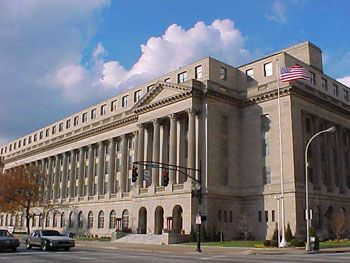Forum-Shopped Bankruptcy Judge Yanked from Case Against City of Oakland
In a long-sought legal victory for the City of Oakland, United States District Judge Benjamin Beaton of Kentucky issued an order on October 31 ending any further role for a bankruptcy judge in the massive “lost profits” case brought against the City by Insight Terminal Solutions (ITS). Bankruptcy Judge Joan Lloyd ruled last Monday that the City interfered with ITS’s business interests when it terminated developer Phil Tagami’s master lease in 2018. In a purported 2-page “JUDGMENT” tacked on to her 45-page “Findings of Fact and Conclusions of Law Addressing Competing Motion for Summary Judgment,” she ruled that the only issue remaining for trial was how much the City would have to pay ITS.
Headlines suggested the City would soon face a judgment in the hundreds of millions of dollars to compensate ITS for Oakland’s alleged interference with ITS’s plans to build and operate a marine export terminal on the West Oakland waterfront.
Not so fast, it turns out. By Friday the tables had turned. The bankruptcy court’s harsh judgment against Oakland will now be revisited by a judge higher up in the judicial hierarchy. District Judge Beaton, unlike Bankruptcy Judge Lloyd, is a presidential appointee confirmed by the Senate to a lifetime position in the federal courts. Judge Beaton has authority to reject Judge Lloyd’s holding that the City is liable for tortious interference with contract and tortious interference with prospective economic advantage.
The City has long argued that the case did not belong in bankruptcy court and moved to have the case transferred, first, to the federal district court in Kentucky and, then, sent by that court to California where the events at issue took place, the witnesses reside, and the courts are familiar with California law.
Judge Beaton’s October 31, 2025 order achieves at least the initial goal of sidelining the bankruptcy judge, who has ruled against the City on nearly every turn. The City first moved to pull the case from Judge Lloyd early in the year, but Judge Beaton deferred consideration of the City’s arguments until last Friday when he found that, “as a matter of both law and economy, the time has come to withdraw” the case from the bankruptcy court.
Judge Beaton highlighted several key factors that favor proceedings in a federal court of general jurisdiction rather than a specialized bankruptcy court with limited jurisdiction. First,”throughout this litigation … Oakland has asserted and re-asserted its right to a jury trial.” Bankruptcy courts have no authority to conduct jury trials and Oakland never agreed to waive its right to a jury trial. Second, the case revolves entirely around questions of California tort law and does not arise in a bankruptcy case or under bankruptcy law, the only province in which the bankruptcy court has specialized expertise. Moreover, the court noted that “judicial economy, uniformity, avoiding confusion, conservation of resources, and dispatch all favor litigating the rest of this case before the District Court.”
Whether the new judge will do a complete reset and overturn the bankruptcy court on key issues or concur with Judge Lloyd’s rulings remains to be seen. But ending Judge Lloyd’s involvement in the case could be the first step toward an outcome favorable to the City.
The next steps in the case will be Judge Beaton’s consideration of two motions by the City addressing the two separate parts of Judge Lloyd’s October 28 ruling – the 45-page statement of “findings of fact and conclusions of law” and the separate 2-page “judgment” purporting to decree that Oakland’s liability to ITS has been established and the only issue remaining for trial is the amount of damages to be awarded.
In Friday’s hearing, Oakland made an oral motion asking Judge Beaton to set aside the purported judgment. To resolve this first motion, Judge Beaton set a short briefing schedule ending on November 11. Judge Beaton’s order includes a statement that, under Supreme Court precedent, the bankruptcy court “may not enter final judgment.” This could be a sign that the court is likely to vacate the 2-page judgment.
The court also invited Oakland to bring a motion – whether characterized as a request for reconsideration, an objection, or appeal – to challenge any aspect of Judge Lloyd’s 45-page summary judgment ruling. Judge Beaton gave Oakland until November 26 to file this motion with the final brief due on January 16, 2026.
No Coal in Oakland issued the following comment on the latest developments: “Judge Beaton’s order is a first step in unwinding last week’s ill-considered decision by Bankruptcy Judge Joan Lloyd. Judge Lloyd relied on elements of then California Superior Court Judge Noël Wise’s ruling that favored would-be coal developers, while turning a blind eye to Judge Wise’s careful and decisive dismissal of developer claims for lost profits as ‘speculative and unreliable.’ Judge Lloyd’s rulings demand reconsideration by a court qualified to evaluate ITS’s claims in light of California law, and in light of prior litigation that already dismissed lost profits claims as unjustified.
“Bringing a billion-dollar lawsuit in a Kentucky bankruptcy court was an extreme case of forum-shopping. We hope to see the federal judge who has taken command of the lawsuit make common sense decisions that will result in dismissal of the outrageous claims against the City of Oakland.”
Photo: Gene Snyder Federal Courthouse in Louisville, Kentucky, where Judge Benjamin Beaton will preside over next steps in the ITS litigation against the City of Oakland. Credit: United States Dept. of Justice.
